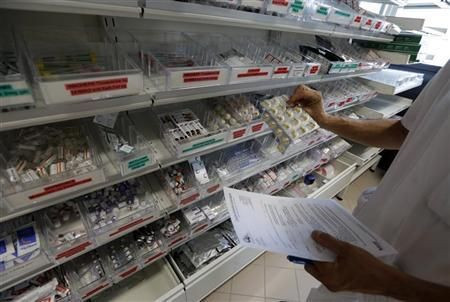Indian States Bihar, Maharashtra Crack Down On Cough Syrup Sale

Authorities in the Indian states of Bihar and Maharashtra imposed restrictions on the sale of a certain type of cough syrup, as part of a crackdown for violating rules regarding branding, and following reports of smuggling and abuse of the drug.
Chemists in Bihar have been directed not to stock more than 1,000 bottles of Phensedyl syrup at a time, following reports that the drug is being smuggled to neighboring Nepal and Bangladesh, the BBC reported citing Bihar drug regulatory authorities.
A 100ml bottle of Phensedyl, a cough syrup brand containing codeine phosphate and owned by Abbott Labs, costs around Rs 70 ($1.28) in Bihar, and sells for four times the price in Nepal and Bangladesh, where it is banned.
Drug inspectors have directed chemists in the state to retain receipts of the sale of codeine phosphate cough syrups.
More than 10 million bottles of Phensedyl were purchased in Bihar during 2011-12, according to the BBC.
"The rampant use of Phensedyl by young men has become a serious threat and very soon we're going to launch an awareness drive in various schools of the state," Bihar drug controller Hemant Kumar Sinha told the BBC.
Physicians say codeine phosphate, if taken beyond prescribed limits, makes people “drowsy and intoxicated.”
Codeine phosphate belongs to the class of medications categorized as narcotic analgesics, and is used to relieve mild-to-moderate pain. It is also used to control coughing that is not controlled by non-narcotic cough suppressants. It works by acting on the brain to dull the cough reflex.
The Food and Drug Administration of India’s Maharashtra state has also come down on chemists, for selling cough syrup in bottles that display brand names in bigger fonts than the generic name of the drug, codeine phosphate, the Hindustan Times had reported earlier this month.
India’s Drugs and Cosmetics Act mandates that the generic name of the drug be printed more conspicuously than the brand name.
The state authorities have also reprimanded chemists against selling codeine phosphate syrups without a prescription or sales receipt. Since 2011, more than 60 chemists’ licenses have been revoked for violations relating to the sale of the drug, the Hindustan Times report added.
It was found late last year that wholesalers in Maharashtra were siphoning off close to 200,000 bottles of Phensedyl, according to a report by the Economic Times newspaper.
However, drug makers say the production and marketing of cough syrups containing codeine phosphate have been in compliance with all rules and regulations.
In November last year, at least 16 people were killed in Pakistan’s Lahore city after they consumed a toxic cough syrup.
Most of those dead were addicts, who consumed cough syrup to get high, and had a history of drug abuse. The victims fell sick after consuming the cough syrup and deaths occurred within a span of three days.
© Copyright IBTimes 2024. All rights reserved.






















